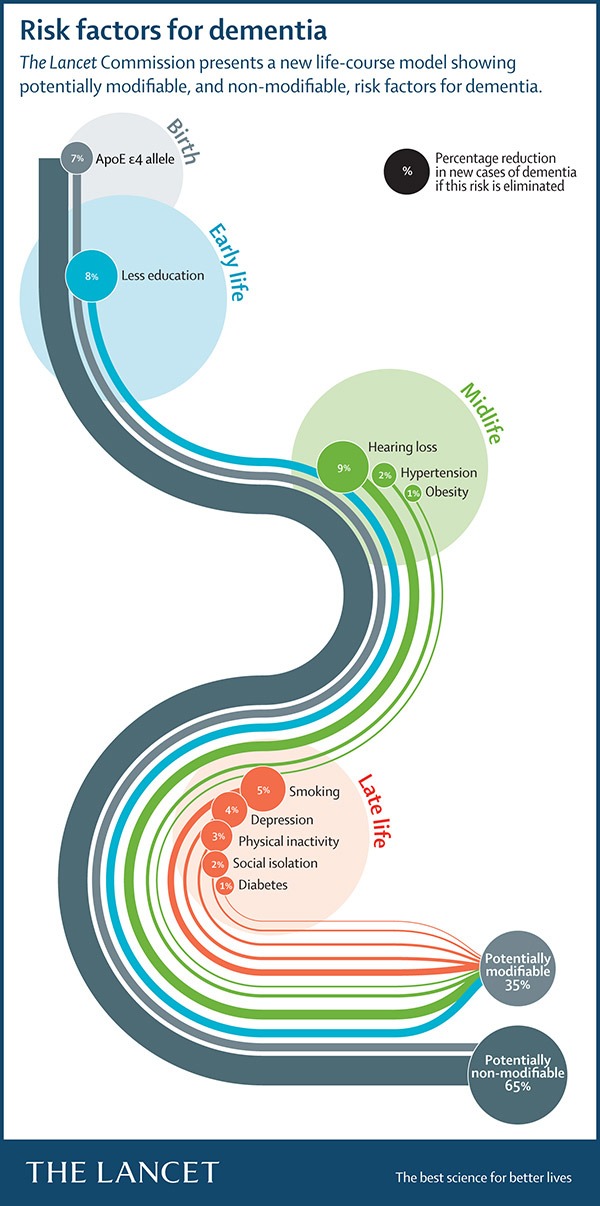Cognitive training, diet, exercise, and vascular management seen to improve cognition even in people with genetic predisposition for dementia (APOE e4)
 ___
___
How do genetics impact early intervention for dementia? (Medical News Bulletin):
“Cardiovascular and neurological diseases, such as dementia, have been linked to dysfunction of a variation of the apolipoprotein E, or APOE, gene, called the APOE e4 allele…The Finnish Geriatric Intervention Study to Prevent Cognitive Impairment and Disability (FINGER) evaluated whether the effectiveness of lifestyle modifications for those at risk of Alzheimer’s disease would be different for those with or without the APOE e4 gene. This was a clinical trial including 60 to 77-year-old individuals from the general population in Finland who were at-risk for cardiovascular diseases and dementia…
The intervention group was provided with specialized cognitive training, diet, exercise, and vascular management, whereas the control group received regular health advice only…The researchers performed genomic DNA tests from blood samples to identify the presence of APOE ?4 and neuropsychological tests to determine cognition outcomes of all participants over the course of 24 months.
The results showed that cognition levels improved for those who participated in the intervention groups. The lifestyle interventions proved effective for those with and without the APOE e4 gene. These results indicate that even those with a genetic predisposition for dementia can benefit from targeted lifestyle modifications. In fact, those who with the genetic susceptibility may have received additional benefits, however, further research will be needed to confirm these results. These findings emphasize the importance of early active interventions.”
The Study
Effect of the Apolipoprotein E Genotype on Cognitive Change During a Multidomain Lifestyle Intervention: A Subgroup Analysis of a Randomized Clinical Trial (JAMA Neurology). From the abstract:
- OBJECTIVE: To examine whether the APOE e4 allele modifies the previously reported significant cognitive benefits of a multidomain lifestyle intervention (prespecified subgroup analysis).
- DESIGN, SETTING, AND PARTICIPANTS: The Finnish Geriatric Intervention Study to Prevent Cognitive Impairment and Disability (FINGER) was a randomized clinical trial in 6 centers across Finland (screening and randomization performed from September 7, 2009, through November 24, 2011; intervention duration, 2 years). Data analysis was performed from August 1, 2015, to March 31, 2016. The study population was at-risk older individuals from the general population. Inclusion criteria were age of 60 to 77 years; Cardiovascular Risk Factors, Aging, and Dementia risk score of at least 6 points; and cognition at a mean level or slightly lower than expected for age. Individuals with dementia or substantial cognitive impairment and conditions that prevented cooperation or safe engagement in the intervention were excluded. APOE genotype data were available for 1175 of the 1260 participants.
- INTERVENTIONS: Participants were randomly assigned in a 1:1 ratio to a multidomain intervention group (diet, exercise, cognitive training, and vascular risk management) or a control group (general health advice). Group allocation was not actively disclosed to participants, and outcome assessors were masked to group allocation.
- MAIN OUTCOMES AND MEASURES: Primary outcome was change in cognition measured through a comprehensive neuropsychological test battery. Analysis was based on modified intention to treat (participants with at least 1 post baseline assessment).
- RESULTS: A total of 1109 participants were included in the analysis: 362 APOE e4 allele carriers (173 intervention and 189 control) and 747 noncarriers (380 intervention and 367 control). The APOE e4 carriers and noncarriers were not significantly different at baseline (except for serum cholesterol level)…Intervention effect was not significantly different between carriers and noncarriers.
- CONCLUSIONS AND RELEVANCE: Healthy lifestyle changes may be beneficial for cognition in older at-risk individuals even in the presence of APOE-related genetic susceptibility to dementia. Whether such benefits are more pronounced in APOE e4 carriers compared with noncarriers should be further investigated. The findings also emphasize the importance of early prevention strategies that target multiple modifiable risk factors simultaneously.
News in Context:
- Study: 46.7 million Americans have Alzheimer’s Disease brain pathology today, so it’s urgent to prevent or at least delay progression to clinical disease
- What are cognitive abilities and how to boost them?
- Solving the Brain Fitness Puzzle Is the Key to Self-Empowered Aging
- Report: 35% of worldwide dementia cases could be prevented by modifying these 9 modifiable risk factors



